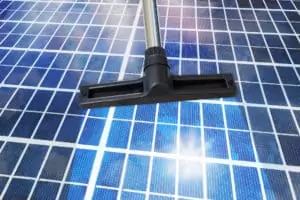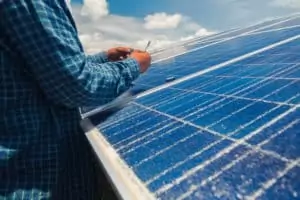Transitioning to renewable energy by installing solar panels is an appealing endeavor for many homeowners. Even with this knowledge, complications can arise when you opt for a DIY approach. While DIY solar installations can be cost-effective, they can also present several challenges.
With a thorough understanding of proper maintenance, homeowners can successfully harness solar power. In this comprehensive guide from 
Given their constant exposure to weather elements, solar panels are vulnerable to weather-related damage, including wind, rain, and UV sunlight. Extreme weather conditions can cause physical damage, such as cracking or delamination, which can hinder the panels’ performance. It’s essential to safeguard them from such breakdowns.
Regular inspection of the panels’ physical condition and timely replacement of damaged panels or components can be beneficial.
Proper maintenance of your solar panels involves regular cleaning and inspection. Dirt and debris can accumulate on the panels, obstructing sunlight and reducing energy production. Regular inspections can help identify potential issues early, extending the lifespan of your system and maintaining its efficiency.
Dirt and debris, like dust, leaves, or bird droppings, can accumulate on the panels’ surfaces, depending on your location and local climate. This can reduce your solar panel efficiency by blocking sunlight. Regular cleaning of the solar panels ensures they receive maximum sun exposure and function effectively. However, it’s important to clean them carefully using appropriate methods and products to avoid scratching or damaging the panels.
Cleaning your solar panels may seem intimidating, but it doesn’t have to be. While rain can naturally wash away some dirt, additional cleaning is often necessary, particularly in dry or dusty areas. A long-handled soft brush or a squeegee with a plastic blade and a cloth-covered sponge can be effective tools. A mild detergent mixed with water can also be beneficial.
To prevent thermal shock that could damage the panels, perform cleaning tasks during cooler parts of the day, such as early morning or late evening.
It’s also recommended to regularly check the mechanical and electrical components to ensure your solar energy system operates safely and efficiently. Monitoring the status of inverters, wiring, mounting equipment, connections, and other system components can help detect any operational issues early. Be sure to look out for any signs of corrosion, wear and tear, or animal activity that could harm the system over time.
Don’t forget to inspect other components like the mounting hardware, inverter, and cables. Keep an eye out for loose or rusty parts, signs of corrosion, frayed wires, and other indicators of potential problems. Regularly checking the inverter display and monitoring energy output can also provide insight into the panels’ performance.
In conclusion, while installing solar panels is a significant step towards sustainable living, neglecting post-installation maintenance can reduce their performance and lifespan. Regular monitoring, preventive measures, and maintenance can ensure your solar power system operates smoothly, providing a steady and reliable energy supply for your home.
One common stumbling block is the placement of the panels. The installation of solar panels extends beyond merely positioning them on the roof. It necessitates meticulous planning and thought.
Factors such as the angle, orientation, and location of the panels significantly influence their efficiency. If the placement is off, you might find your panels producing less energy than expected, diminishing the effectiveness of your solar investment.
Improper wiring is another critical concern. Solar panels generate DC (Direct Current), which must be converted into AC (Alternating Current) for household use. This conversion involves an inverter and a complex wiring process. Mistakes in this process can lead to electrical faults, inefficient energy conversion, and even safety risks like electrical fires. Additionally, the wiring needs to be shielded from external factors like weather and pests, which can be a daunting task for DIY installers.
These issues underscore the intricacies of solar panel installation and illustrate why a seemingly straightforward project can become a complex one for the unprepared DIY enthusiast. However, these challenges are not insurmountable. In the subsequent sections, we will discuss how to tackle these common hurdles and ensure a successful solar system installation.
While DIY solar installation can certainly be a rewarding experience, there comes a point where expert knowledge and specialized equipment are crucial. Entrusting this task to professionals can ensure that the job is done efficiently, safely, and with optimal energy output.
By hiring seasoned experts, you not only benefit from their years of experience but also gain peace of mind knowing that your solar system will be set up to the highest standards

For instance, if your solar installation involves complex electrical configurations or a large-scale or grid-tied system, it might be safer and more practical to bring in a professional. These experts have the necessary experience to handle electrical tasks and ensure your solar system operates safely and efficiently.
Factors such as the solar panels’ orientation and angle, the type and location of the inverter, and the selection of appropriate electrical equipment can significantly impact your solar power system’s performance and efficiency. If you’re unsure about managing these elements effectively, it’s wise to consult a professional installer.
Your local weather conditions can also influence the need for professional installation. If your region is prone to severe weather like high winds or hail, a Most importantly, legal and regulatory considerations can’t be overlooked. Many areas require permits and inspections for solar installations, and non-compliance can lead to fines or removal orders. Professional installers are familiar with these requirements and can help navigate the process smoothly.
In conclusion, evaluating your technical abilities, the project’s complexity, local weather conditions, and legal requirements can guide you in deciding when it’s worth investing in Many solar panel owners frequently encounter issues like reduced efficiency due to dirt and debris accumulation, potential damage from extreme weather conditions, and wear and tear from UV exposure over time.
It’s recommended to inspect your solar panels every 6 months and clean them as needed. However, in areas with higher levels of dust or pollen, more frequent cleaning might be necessary to maintain optimal efficiency.
No, it’s best to use water and a soft cloth or sponge to avoid scratching the panels. If necessary, a mild detergent can be used, but it’s essential to rinse thoroughly to ensure no residue remains.
While solar panels are designed to withstand various weather conditions, you can ensure longer durability by installing them at an angle that allows snow and debris to slide off, securing them properly to prevent wind damage, and periodically checking for any loose connections or wear.
Apart from cleaning, it’s important to monitor your solar panels’ performance and check for any drop in efficiency. Regularly inspecting the mounting equipment, connectors, and checking the inverter’s green light can help identify and address issues early on.
The adoption of solar panels is undeniably a leap towards sustainable and green energy, promising both environmental benefits and potential cost savings. However, like all valuable assets, solar installations require diligent care to ensure they operate at peak performance throughout their lifespan.
By staying informed and proactive, solar panel owners can not only extend the longevity of their panels but also ensure consistent, efficient energy production. Ultimately, whether opting for DIY methods or seeking professional assistance, a well-maintained solar system is an investment in a brighter, more sustainable future! For more valuable resources on solar panels, contact Strive Solar today.